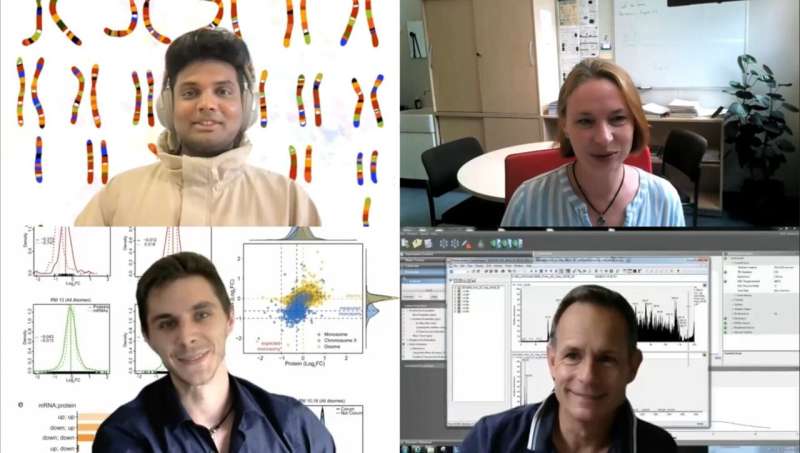When a chromosome is lost: How do human cells react to monosomy?

Human cells are usually diploid—they contain two sets of chromosome. Cells in which one chromosome is missing from the duplicated chromosome set are generally not viable. For a long time, the mechanisms responsible for the loss of viability were unknown. This is where researchers at the Technical University of Kaiserslautern (TUK) came in. In collaboration with the European Molecular Biology Laboratory (EMBL) in Heidelberg and the Koblenz University of Applied Sciences to investigate the effects of the reduced number of chromosomes in human cells. In the process, they have succeeded for the first time in implementing an experimental approach with viable monosomic cells. The journal Nature Communications has published the basic findings.
Monosomy occurs when chromosomes are incorrectly distributed during routine cell division and cells subsequently lack one chromosome in an otherwise double (diploid) set. The only form of this deviation in chromosome number (aneuploidy) that human cells can survive is known as Turner syndrome. The hallmark of the hereditary disease, which occurs in women: only one of the two X sex chromosomes is present. "However, what happens in human somatic cells that are missing other than sex chromosome had not been explored until now, because monosomic cells are generally not viable," explains Prof. Zuzana Storchova who conceived the study.
Dr. Narendra Kumar Chunduri, first author of the study, reports, "When monosomy occurs, the protein 'p53," encoded by the so-called tumor suppressor gene TP53, ensures that the cell cycle stops. In other words, the cells stop dividing. Therefore, we have switched off this gene in one part of our cell lines, which were originally derived from human retina cell lines, to downregulate the production of the encoded protein. Thus, for the first time, we succeeded in generating stable monosomic cell lines for research purposes."
The research team subsequently focused on the effects of monosomy on proliferation (cell growth/multiplication), genomic stability and how chromosome loss affects the amount of mRNAs and proteins (transcriptome and proteome, respectively). "Strikingly," Chunduri said, "we observed reduced levels of cytoplasmic ribosomal proteins and reduced protein synthesis (protein translation) in all monosomal cell lines. Accordingly, we hypothesize that chromosome loss impairs ribosomal biogenesis and thereby cellular proliferation. We also showed that this change triggers cell cycle arrest and or senescence via the p53 signaling pathway.
Monosomy and cancer
The findings also shed light on the link between cancer and monosomy. Recurrent loss of an entire chromosome or chromosome arm is common in certain tumors, such as neuroblastoma, lung cancer, and myeloid malignancies. Chunduri explains "Since monosomies are viable only without p53, we predicted that the cancers with monosomy must have defective p53 pathway. The analysis of scientific databases of cancer-related changes, such as "The Cancer Genome Atlas (TCGA)' and "Cancer Cell Lines Encyclopedia (CCLE)", indeed revealed a strong association of monosomy with p53 inactivation and ribosomal pathway impairment." This analysis would not be possible without collaboration with the biomathematicians Xiaoxiao Zhang and Prof. Maik Kschischo from UAS Koblenz.
Gene dosage effect
The research team also performed a systematic transcriptome and proteome analysis of monosomic cell lines in comparison to their parental cell lines—i.e., the quantification of all messenger RNAs (mRNAs) transcribed based on DNA, as well as the quantification of all proteins in the cells. As expected, this showed that the expression of genes localized on the monosome was reduced. Bioinformatician Paul Menges adds, "Yet, we observed the lower levels in only 20 percent of the encoded proteins. We suspect that gene dosage effects came into play here. The cells need to return to their 'natural' diploid protein levels to sustain their function and thus compensate for the chromosome loss. We envision two possible scenarios: First, translation of mRNAs encoded using the genes could be selectively increased, or second, protein degradation is reduced. Our results suggest that cells use multiple pathways to mitigate the consequences of altered gene expression."
"In summary, we present for the first time a successful experimental approach to study the effects of monosomy in human somatic cells," Storchova summarizes. "In doing so, we were able to build on our knowledge of aneuploid cells gained in previous studies. We will now further investigate the effects of monosomy, to better understand its contribution to cancer."
More information: Narendra Kumar Chunduri et al, Systems approaches identify the consequences of monosomy in somatic human cells, Nature Communications (2021). DOI: 10.1038/s41467-021-25288-x
Journal information: Nature Communications
Provided by Technische Universität Kaiserslautern




















